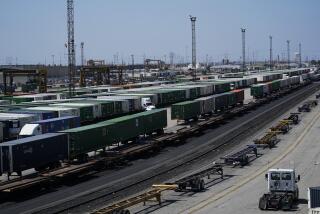Official Urges Review of Smog Policy
- Share via
Strongly suggesting that regulations need to be stricter, William A. Burke, the new chairman of the South Coast Air Quality Management District, called Friday for a sweeping reexamination of the agency’s strategy for curbing air pollution in poor, minority neighborhoods.
In his first policy address since his election as chairman one month ago, Burke called for a review of regulations governing toxic emissions--air pollutants linked to cancer and birth defects--that have particular relevance for neighborhoods near refineries and other heavy industries.
In addition, as part of an eight-point initiative, Burke, the first African American to preside over the AQMD board, called for the creation of “rapid deployment response teams” to investigate neighborhood concerns about the dangers of airborne emissions.
Burke said he wants the teams initially to focus on the San Pedro area, where emissions from petroleum tankers have prompted lawsuits against oil companies, and a civil rights complaint that a key portion of the AQMD’s pollution control strategy discriminates against poor people and minorities.
If approved by the full board next month, Burke’s proposals could mark a new direction for an agency that has been harshly criticized by environmental groups, social activists and dissident agency staff members in recent years for softening its stand against air pollution.
“It is a remarkable set of initiatives designed to address concerns regarding environmental justice,” said Barry R. Wallerstein, the AQMD’s acting executive officer. “It will lead to dialogue and understanding and a stronger consensus on how to approach these issues.”
Burke’s remarks also received an enthusiastic reception from Los Angeles environmentalists.
“We were certainly pleased with Dr. Burke’s interest in environmental justice and with the air toxics issue,” said Linda Waade, executive director of the Coalition for Clean Air.
Some of Burke’s proposals, though, seemed to run counter to his own voting record on air toxics issues. He sided with the majority of the board three years ago in rejecting regulations, proposed by the agency’s staff, that were significantly tougher than the rules adopted by the board.
It is those rules Burke now wants reexamined.
Burke was unavailable for comment, but a representative of his office said, “Clearly, he has changed his mind” on the issue of air toxics.
As part of his initiative package, Burke proposed establishing a task force “to investigate local environmental justice concerns,” starting with an examination of the issues, raised in a federal civil rights complaint that the AQMD’s controversial pollution trading program discriminates against poor neighborhoods near San Pedro.
The pollution trading program allows refineries to meet emissions control requirements by buying and scrapping old cars instead of installing expensive pollution control equipment on their own port facilities.
Burke also called for the creation of incentives to prompt voluntary cleaning up or removal of diesel engines, which he said have a disproportionate effect on low-income communities. According to the agency, diesel trucks account for about 5% of a form of fine particle pollution known as PM-10.
Burke also called for expansion of the AQMD’s monitoring of air pollution in areas known as toxic hot spots, typically communities where several sources of emissions are concentrated. Up to now, according to agency officials, the AQMD has monitored emissions from each source without quantifying the collective impact of them all.
In addition, he advocated a broader role for the agency in assessing potential air pollution impacts from any new projects in the region such as landfills.
He also proposed a series of town hall meetings throughout the four-county region “to increase residents’ access and participation in the development of air pollution control programs.”
More to Read
Sign up for Essential California
The most important California stories and recommendations in your inbox every morning.
You may occasionally receive promotional content from the Los Angeles Times.










